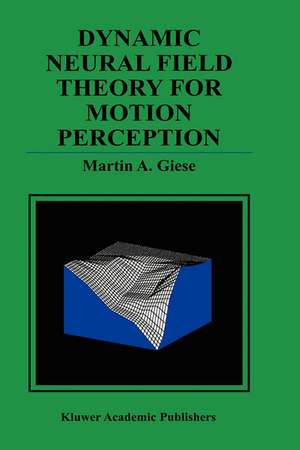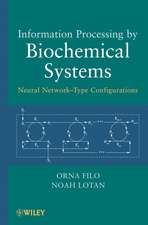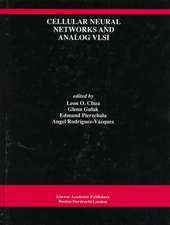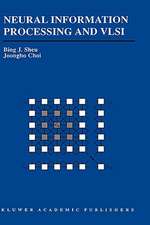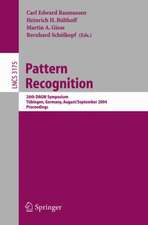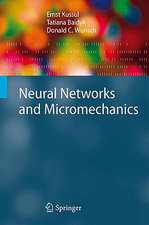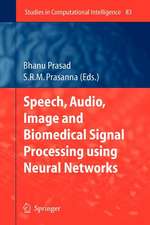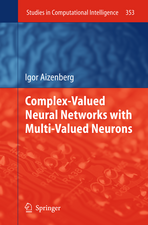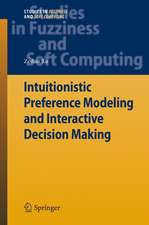Dynamic Neural Field Theory for Motion Perception: The Springer International Series in Engineering and Computer Science, cartea 469
Autor Martin A. Gieseen Limba Engleză Hardback – 31 oct 1998
This framework uses dynamic neural fields as a key mathematical concept. The author demonstrates how neural fields can be applied for the analysis of perceptual phenomena and its underlying neural processes. Also, similar principles form a basis for the design of computer vision systems as well as the design of artificially behaving systems. The book discusses in detail the application of this theoretical approach to motion perception and will be of great interest to researchers in vision science, psychophysics, and biological visual systems.
| Toate formatele și edițiile | Preț | Express |
|---|---|---|
| Paperback (1) | 639.59 lei 43-57 zile | |
| Springer Us – 12 oct 2012 | 639.59 lei 43-57 zile | |
| Hardback (1) | 646.11 lei 43-57 zile | |
| Springer Us – 31 oct 1998 | 646.11 lei 43-57 zile |
Din seria The Springer International Series in Engineering and Computer Science
- 24%
 Preț: 1041.97 lei
Preț: 1041.97 lei - 20%
 Preț: 643.50 lei
Preț: 643.50 lei - 18%
 Preț: 1225.62 lei
Preț: 1225.62 lei - 18%
 Preț: 965.02 lei
Preț: 965.02 lei - 20%
 Preț: 646.12 lei
Preț: 646.12 lei - 18%
 Preț: 948.79 lei
Preț: 948.79 lei - 20%
 Preț: 646.62 lei
Preț: 646.62 lei - 15%
 Preț: 637.46 lei
Preț: 637.46 lei - 20%
 Preț: 643.83 lei
Preț: 643.83 lei - 18%
 Preț: 949.23 lei
Preț: 949.23 lei - 20%
 Preț: 644.48 lei
Preț: 644.48 lei - 20%
 Preț: 994.92 lei
Preț: 994.92 lei - 20%
 Preț: 645.97 lei
Preț: 645.97 lei - 18%
 Preț: 946.87 lei
Preț: 946.87 lei - 20%
 Preț: 995.57 lei
Preț: 995.57 lei - 18%
 Preț: 956.99 lei
Preț: 956.99 lei - 20%
 Preț: 644.98 lei
Preț: 644.98 lei - 15%
 Preț: 649.54 lei
Preț: 649.54 lei - 18%
 Preț: 950.21 lei
Preț: 950.21 lei - 18%
 Preț: 1221.38 lei
Preț: 1221.38 lei - 18%
 Preț: 957.62 lei
Preț: 957.62 lei - 15%
 Preț: 643.99 lei
Preț: 643.99 lei - 18%
 Preț: 948.47 lei
Preț: 948.47 lei - 18%
 Preț: 947.35 lei
Preț: 947.35 lei - 20%
 Preț: 1284.65 lei
Preț: 1284.65 lei - 20%
 Preț: 1633.95 lei
Preț: 1633.95 lei - 20%
 Preț: 1285.78 lei
Preț: 1285.78 lei
Preț: 646.11 lei
Preț vechi: 760.13 lei
-15% Nou
Puncte Express: 969
Preț estimativ în valută:
123.63€ • 129.41$ • 102.90£
123.63€ • 129.41$ • 102.90£
Carte tipărită la comandă
Livrare economică 31 martie-14 aprilie
Preluare comenzi: 021 569.72.76
Specificații
ISBN-13: 9780792383000
ISBN-10: 0792383001
Pagini: 257
Ilustrații: XIX, 257 p.
Dimensiuni: 155 x 235 x 18 mm
Greutate: 0.58 kg
Ediția:1999
Editura: Springer Us
Colecția Springer
Seria The Springer International Series in Engineering and Computer Science
Locul publicării:New York, NY, United States
ISBN-10: 0792383001
Pagini: 257
Ilustrații: XIX, 257 p.
Dimensiuni: 155 x 235 x 18 mm
Greutate: 0.58 kg
Ediția:1999
Editura: Springer Us
Colecția Springer
Seria The Springer International Series in Engineering and Computer Science
Locul publicării:New York, NY, United States
Public țintă
ResearchCuprins
1 Introduction.- I Basic Concepts.- 2 Visual perception of motion.- 3 Basic principles of the dynamic approach.- 4 Dynamic neural fields.- II Model for Motion Perception.- 5 Dynamic neural field model for motion perception.- 6 Necessity of the concepts: Model for the motion quartet.- 7 Sufficiency of the concepts: Field model for 2D-motion perception.- 8 Relationships: neural fields and computational algorithms.- 9 Identification of field models from neurophysiological data.- III Other Applications of Neural Fields.- 10 Neural field model for the motor planning of eye movements.- 11 Technical applications of neural fields.- 12 Discussion.- Appendices.- A Appendix of chapter 3.- A.1 Relationship: Eye-Position and Relative Phase Dynamics.- B Appendix of chapter 6.- B.1 Geometry Dependence of Feed-Forward Input.- B.2 Stochastic Bistable Dynamics.- B.3 Parameters of the Model for the Motion Quartet.- C Appendix of chapter 7.- C.1 Properties of the Interaction Function.- C.2 One-Dimensional Neural Field Model for Motion Direction.- C.3 Parameters of the Neural Field Model.- D Appendix of chapter 8.- D.1 Proof of Theorem 4.- D.2 Proof of Lemma 1.- D.3 Proof of Theorem 5.- E Appendix of chapter 9.- E.2 Least Squares Estimation of Kernel Functions.- E.3 Equivalent Feed-Forward System for a Linear Threshold.- F Appendix of chapter 11.- F. 1 Transformation between Robot and World Coordinates.- F.2 Transformations between the Perceptive Spaces.- F.3 Learning of the Parameters of the Approximation Dynamics.- List of Symbols.
